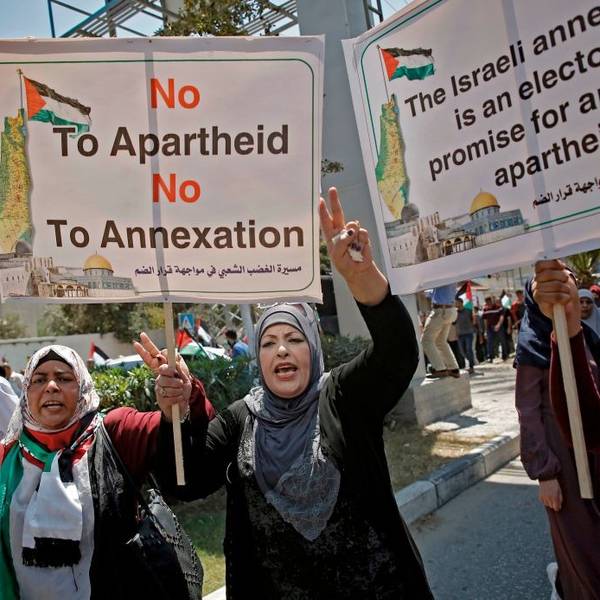In wandering, occasionally confused comments at a joint press conference on Wednesday with Israeli Prime Minister Benjamin Netanyahu, President Donald Trump appeared to call into question the United States' backing of a two-state solution for the Israeli-Palestinian conflict.
"I'm looking at two states and one state. I like the one that both parties like. I can live with either one," Trump said, as Netanyahu laughed. "I thought for a while it looked like the two-state, looked like it may be the easier of the two, but honestly if Bibi [Netanyahu] and the Palestinians and Israel are happy, I am happy with the one they like the best."
Middle East Eye also noted that "Netanyahu said that he did not want to see a two-state solution that would give rise to a 'terrorist, Islamic dictatorship.'"
"The Israel-Palestine peace deal has for decades been predicated on agreeing to the creation of a Palestinian state to live beside Israel as an independent nation," the Middle East Eye pointed out. "However, the White House under Trump has indicated it is no longer committed to it as a defacto solution. "
Despite calling the two-state goal into question, Trump also declared during the press conference that the U.S. was committed to a "really great" peace deal, once again emphasizing his fondness for the concept of deals. Trump also appeared to be saying that the U.S. wouldn't broker such a deal, however.
"The United States will encourage a really great peace deal," Trump said. "It is the parties themselves that must directly negotiate. Both sides will have to make compromises."
Trump's comments often veered far off topic. For example, when asked about the rise in anti-Semitic incidents in the U.S. since his election, Trump bragged at length about his electoral college win. (Prominent white supremacist Steve Bannon was also present during the press conference.)
A transcript of the bizarre exchange was posted online soon afterward:
Yet Netanyahu appeared determined to affirm his unabashed support for the president, and followed up on the odd exchange by defending Trump from charges of anti-Semitism.
"There is no greater supporter of the Jewish people and the Jewish state than President Donald Trump," he said:
The two right-wingers also bolstered each other's hostile stance toward Iran and denigrated the nuclear deal brokered by Obama administration, which lead the antiwar group CodePink to speculate that Trump and Netanyahu were "pumping each other up for war on Iran."



